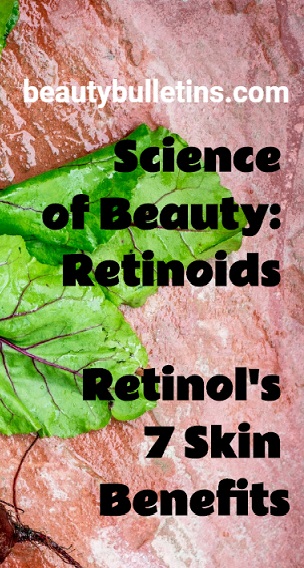Science of Beauty: Retinoids. Retinol’s 7 Skin Benefits.
WHAT IS RETINOL?
Vitamin A
Vitamin A is a fat-soluble vitamin present in food in two different forms: preformed vitamin A (retinyl esters ), found in animal-based food such as meat, fish, poultry, and dairy, and provitamin A (carotenoids), found in plant-based food such as fruits (orange fruit such as apricot & mango) and vegetables (carrot, pumpkin & sweet potato ). Beta-carotene is the main carotenoid compound; it displays the greatest provitamin A activity as well as significant antioxidant activity. Beta-carotene protects cells from free radical damage.
 Retinoic acid is the most active biological form of vitamin A .
Retinoic acid is the most active biological form of vitamin A .
Vitamin A
is essential for the correct functioning of epithelial cells. An example is the epidermis, the outermost layer of the skin. This ingredient may be derived from animals. From PETA’s Caring Consumer: Can come from fish liver oil (e.g., shark liver oil), egg yolk, butter. It can aslo come from lemongrass, wheat germ oil, carotene in carrots or other vegetables and synthetics.
“For dermatologists,” dermatologist Patricia Farris, MD, says, “they’re a favorite because there’s so much science behind them.“
When applied topically, retinol has tons of impressive anti-aging benefits.
It helps to:
1-Increase skin’s elasticity
2-Boost collagen production.
3-Diminish age or sun spots
4-Reverse photoaging
5-Help fight acne
6-Increase cell turnover.
7-Help psoriasis

Retinoids are used in the treatment of many diseases and are effective in the treatment of a number of dermatological conditions such as inflammatory skin disorders, acne, skin cancers, disorders of increased cell turnover (e.g. psoriasis), photoaging, and skin wrinkles.
They’ve been shown to prevent the rise of collagenase — the enzyme that breaks down collagen — after UV exposure. One of the retinol benefits is its ability to unclog pores and prevent further build up.
For those who battle psoriasis, one of retinol’s benefits is the ability to slow down the cell growth in those areas. So instead of the buildup of thick, white or red patches of skin, retinols can help reduce the inflammation and appearance of psoriasis.
When should I use retinol? When exposed to sunlight retinol will break down, so using retinol at night you should avoid direct exposure to fluorescent or halogen light sources. Make sure to store in a cupboard or drawer away from light.
Skincare is never as simple as any one ingredient, no matter how good it is so, blends can be the best.
In solution, several fat-soluble antioxidants offer protection, while in foods and food extracts, accompanying lipids(fats) and antioxidants such as phospholipids, tocopherols(vitamin E), and carotenes act to stabilize retinol.
As great as retinoids are for all skin types, everyone’s skin needs more than just one brilliant ingredient. Think of it like your diet: If you only ate carrots, you’d soon become malnourished, even though the vitamin A they contain is good for you. Likewise, your skin needs a mix of beneficial ingredients to thrive.
What else you need to know: When you first use retinoids, you may notice redness or worsening of acne. You can minimize this by using the product every other day until your body gets used to it.
Gary Fisher, a professor of dermatology at the University of Michigan Medical School. “Many over-the-counter formulas claim you’ll see results within weeks,” says Fisher. “But in my experience, it takes an average of 2 & a half months for retinoic acid to produce noticeable changes in the skin. So stick with it for at least that long to see the benefits.”
Sorry, there’s no easy fix!
© 2018. beautybulletins.com All Rights Reserved. Please do not reproduce or republish content without permission.

Sources: NIH, Live Strong, Sciencedirect, Researchgate, WebMD, PETA







